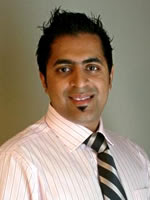 Are you wondering what Invisalign treatment is really like, and what effect it will have on your day-to-day activities? Will it slur your speech? Will people know you're in treatment? You're not alone in your concerns! Dr. Trushar Patel, Dr. Tammy Zeineddin and our team thought we’d share this list of questions and answers for anyone pondering Invisalign treatment at 19th Street Dental.
Are you wondering what Invisalign treatment is really like, and what effect it will have on your day-to-day activities? Will it slur your speech? Will people know you're in treatment? You're not alone in your concerns! Dr. Trushar Patel, Dr. Tammy Zeineddin and our team thought we’d share this list of questions and answers for anyone pondering Invisalign treatment at 19th Street Dental.How exactly does Invisalign work?
Using 3-D computer imaging technology, Invisalign creates a series of custom-made, clear aligners exclusively for your teeth, based on the treatment plan that we specify for you. Each aligner moves teeth incrementally and is worn for about two weeks, then replaced by the next in the series until the final position is achieved.
Will I experience pain during treatment?
Most people experience temporary discomfort for a few days after a new aligner is placed. This feeling of pressure is normal and is a sign that Invisalign is working by sequentially moving your teeth to their final destination.
Can other people see that I'm in treatment?
One of the benefits of Invisalign is that the aligners are clear. You can straighten your teeth without anyone knowing.
Can I smoke during treatment?
We discourage smoking while wearing the aligners as they may become discolored.
Are there any foods I shouldn’t eat while in treatment?
You can eat normally during the entire course of treatment. One of the advantages of Invisalign is that the aligners are removable. Simply take the aligners out before each meal, brush when you're finished eating, then reinsert the aligners afterward.
What about chewing gum?
We recommend removing your aligners for all meals and snacks, as gum and other chewy substances can stick to the aligners.
How often must I wear my aligners?
Aligners should be worn all day, except when eating, brushing, and flossing.
Will my speech be affected by the aligners?
As with any orthodontic treatment, aligners may temporarily affect your speech. If this does happen, your tongue will adjust within a day or two and your speech should return to normal.
How do I clean my aligners?
The best way to clean your aligners is by brushing and rinsing them in lukewarm water.
How often must I visit 19th Street Dental during treatment?
For most patients, visits every 4-6 weeks are frequent enough for us to determine that your treatment is progressing properly. Dr. Patel will provide you with a specific schedule that supports your individual treatment plan.
Give our office a call to schedule an appointment for an initial exam.









